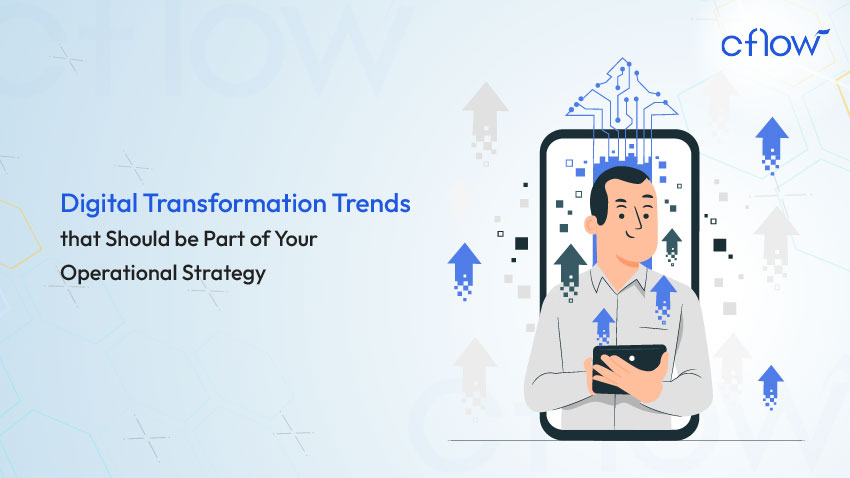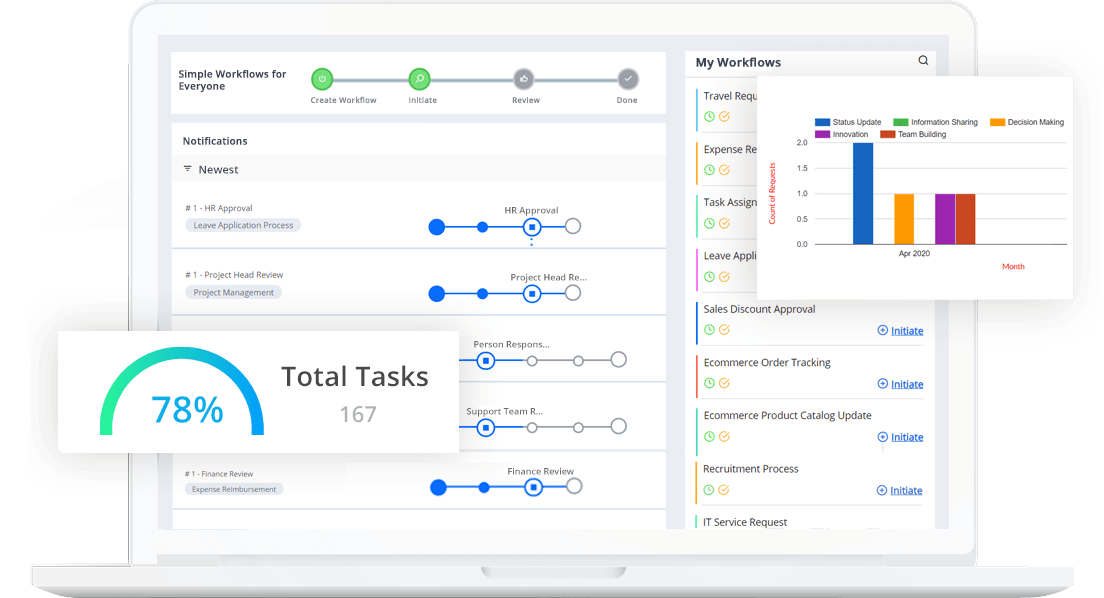Top 10 Digital Transformation Trends that Should be Part of Your Operational Strategy

Key takeaways
- Digital transformation continues to evolve, with AI, automation, and cloud computing leading the way in 2025.
- The digital transformation market is projected to grow significantly, driven by technological advancements and industry adoption.
- Healthcare digital transformation trends include AI-powered diagnostics, telemedicine, and blockchain for data security.
- Businesses that fail to adopt digitalization trends risk losing competitiveness in a rapidly evolving landscape.
- Cflow provides a robust digital transformation platform that automates workflows and enhances business efficiency.
Introduction
Digital transformation has become the backbone of modern businesses, enabling organizations to leverage emerging technologies to streamline operations, enhance customer experiences, and gain a competitive edge. As we enter 2025, digital transformation is no longer an option but a necessity. Companies across industries, from healthcare to finance, are investing in automation, AI, and cloud computing to future-proof their operations.
This blog will explore digital transformation trends for 2024, the top digital transformation trends for 2025, and how businesses can leverage digitalization trends to stay ahead of the curve. We will also discuss how Cflow, an AI-powered workflow automation platform, can help organizations embrace these advancements.
Table of Contents
What is Digital Transformation?
Digital transformation is the integration of digital technologies into all aspects of a business, fundamentally changing how organizations operate and deliver value to customers. It involves leveraging technologies such as artificial intelligence, cloud computing, automation, big data analytics, and the Internet of Things (IoT) to enhance business processes and customer experiences.
In 2024 and beyond, digital transformation trends will continue to reshape industries by improving efficiency, enhancing security, and enabling data-driven decision-making.
Why is Digital Transformation Important?
Here are 5 reasons why digital transformation is essential for the growth of your organization.
- Enhanced Efficiency: Automation and AI-driven solutions reduce manual work and streamline operations.
- Improved Customer Experience: Digitalization trends enable personalized interactions and faster response times.
- Competitive Advantage: Businesses adopting digital transformation stay ahead in rapidly evolving markets.
- Data-Driven Decision Making: AI and analytics tools help companies make informed strategic decisions.
- Cost Savings: Cloud solutions and automation reduce operational expenses.
Companies that fail to embrace digital transformation market trends risk falling behind in an increasingly digital world.
Key Statistics on Digital Transformation
- According to Markets and Markets, The digital transformation market is poised to grow to $3,289 billion by 2030.
- A Newgen State of Digital Transformation Report finds that 77% of the surveyed enterprises have started their digital transformation journey in the past 2 years.
- According to a recent statistic, the United States is expected to account for nearly 35% of the global spending in Digital Transformation
Top Digital Transformation Trends for 2024 at a Glance
AI and Automation – Artificial intelligence and automation are set to play a dominant role in 2024, enhancing business efficiency and decision-making. Companies are increasingly integrating AI-driven solutions to optimize customer service, automate workflows, and gain valuable insights from data analytics. Automation tools such as robotic process automation (RPA) and AI-powered chatbots are expected to continue expanding across various industries.
Cloud Computing Growth
The shift to cloud-based infrastructure is accelerating as organizations prioritize scalability, cost-effectiveness, and remote accessibility. Multi-cloud and hybrid cloud solutions are becoming mainstream, allowing businesses to optimize workload management while improving security and compliance.
Blockchain in Business
Blockchain technology is gaining traction in various industries, offering secure and transparent transactions. It is particularly relevant for supply chain management, financial services, and healthcare, where data integrity and security are crucial. Smart contracts and decentralized finance (DeFi) are also expected to evolve, driving further blockchain adoption.
5G Connectivity
The expansion of 5G networks will revolutionize industries by enabling faster and more reliable internet connections. Businesses will leverage 5G for real-time data processing, IoT advancements, and improved remote working capabilities. Industries such as healthcare, manufacturing, and logistics will benefit significantly from high-speed, low-latency connectivity.
Cybersecurity Enhancements
With the rise of cyber threats, businesses are prioritizing cybersecurity investments to protect sensitive data. Advanced threat detection using AI, zero-trust security models, and biometric authentication are becoming essential components of cybersecurity strategies. Companies are focusing on safeguarding customer data and ensuring compliance with evolving regulations.
Digital Twin Technology
Digital twin technology, which creates virtual replicas of physical assets, is expected to become more mainstream. Businesses are using digital twins to optimize product development, enhance predictive maintenance, and improve operational efficiency. Industries like healthcare, construction, and manufacturing are leveraging digital twins for real-time simulations and analytics.
Low-Code and No-Code Development
The rise of low-code and no-code platforms is making it easier for businesses to develop and deploy applications without extensive programming knowledge. This trend is driving digital transformation by enabling non-technical employees to build solutions that streamline workflows, enhance customer engagement, and improve business agility.
Top 10 Digital Transformation Trends for 2025
AI-Driven Business Intelligence
Artificial intelligence-driven business intelligence is revolutionizing decision-making processes across industries. Companies such as Amazon and Netflix utilize predictive analytics and machine learning to understand consumer behavior, optimize recommendations, and refine supply chain operations. AI-powered analytics tools are enhancing real-time decision-making, allowing businesses to respond dynamically to market changes and customer preferences.
Hyperautomation
Hyperautomation combines AI, robotic process automation (RPA), and other advanced technologies to automate complex business processes. In banking, hyperautomation accelerates fraud detection by analyzing vast amounts of transaction data in real-time. Manufacturing firms employ RPA to automate repetitive tasks such as quality control, inventory tracking, and production scheduling, thereby improving efficiency and reducing human errors.
Edge Computing
Edge computing decentralizes data processing, reducing latency and increasing efficiency. In the healthcare industry, edge computing enables real-time patient monitoring and diagnostics, ensuring that critical health data is processed instantly without relying on distant cloud servers. Autonomous vehicles also depend on edge computing to analyze data from sensors and cameras, allowing them to make split-second driving decisions.
Quantum Computing
Quantum computing is poised to solve complex computational problems at an unprecedented scale. Tech giants such as IBM and Google are leveraging quantum computing to revolutionize cybersecurity, logistics, and drug discovery. Pharmaceutical companies use quantum algorithms to simulate molecular interactions, accelerating the development of new medicines and treatment solutions.
Personalized Digital Customer Experiences
Businesses are leveraging AI-powered chatbots, recommendation engines, and virtual assistants to enhance customer interactions. In retail, AI-driven platforms analyze past purchases and browsing history to personalize shopping experiences. Similarly, the healthcare industry employs AI chatbots to schedule appointments, provide health-related information, and remind patients to take their medications.
Sustainable Digitalization
Sustainability is a growing priority, and businesses are integrating eco-friendly technologies into their digital strategies. Data centers are becoming more energy-efficient through AI-driven resource optimization. Companies are also investing in smart grids and IoT-powered energy management systems to minimize waste and reduce environmental footprints.
Decentralized Finance (DeFi)
DeFi is transforming the financial sector by enabling peer-to-peer transactions through blockchain technology. Cryptocurrencies and decentralized exchanges offer users greater control over their financial assets, reducing reliance on traditional banking institutions. Businesses are exploring DeFi for cross-border payments, lending platforms, and digital asset management.
Metaverse and Extended Reality (XR)
The metaverse is reshaping industries by offering immersive digital experiences. Real estate firms use extended reality (XR) to provide virtual property tours, allowing buyers to explore properties remotely. In education, universities and training centers are incorporating VR and AR-based simulations to enhance learning experiences and technical training programs.
Cyber Resilience
With cyber threats on the rise, companies are strengthening their cybersecurity frameworks. AI-powered security tools detect anomalies and potential breaches before they cause harm. The financial sector, in particular, relies on advanced encryption and blockchain-based authentication to protect customer data and ensure compliance with global regulations.
Industry-Specific Digital Transformation
Tailored digital transformation solutions are enabling industries to modernize operations effectively. Smart hospitals integrate AI for diagnostic imaging and patient care, while financial institutions implement blockchain for secure transactions. Manufacturers use IoT-driven predictive maintenance to prevent machinery failures and optimize production lines.
Regional-wise Use Cases of Digital Transformation
Digital transformation varies across regions due to differences in economic conditions, technological infrastructure, and regulatory frameworks. Each region faces unique challenges and opportunities when implementing digital initiatives. Understanding regional use cases helps businesses tailor their digital transformation strategies to specific market conditions.
In North America, digital transformation is driven by technological innovation and a highly competitive business environment. The United States and Canada have seen rapid adoption of AI, cloud computing, and automation across industries. In healthcare, AI-driven diagnostics and telemedicine have revolutionized patient care, reducing wait times and improving medical outcomes. The financial sector has also embraced blockchain and decentralized finance (DeFi) to enhance security and streamline transactions.
Europe has taken a strong regulatory approach to digital transformation, with GDPR shaping data privacy and security policies. Businesses in the region focus on compliance while leveraging emerging technologies for growth. In Germany, Industry 4.0 has transformed manufacturing, integrating IoT and smart factory automation. The UK’s fintech sector has experienced significant advancements, with digital banking and payment solutions becoming mainstream.
In Asia-Pacific, rapid urbanization and increasing internet penetration have fueled digital adoption. China leads in e-commerce and mobile payments, with companies like Alibaba and Tencent redefining digital retail experiences. In India, the government’s Digital India initiative has accelerated the adoption of digital payments, e-governance, and AI-driven solutions in agriculture and healthcare. Japan and South Korea are at the forefront of 5G deployment, enabling smart cities and autonomous transportation systems.
Latin America is experiencing steady growth in digital transformation, driven by the need for financial inclusion and improved infrastructure. Brazil’s digital banking sector is expanding rapidly, providing financial services to previously unbanked populations. In Mexico, logistics and supply chain companies are leveraging IoT and automation to enhance operational efficiency.
Africa faces unique challenges, including limited internet connectivity and infrastructure gaps. However, mobile technology has been a game-changer in financial services, with mobile money platforms like M-Pesa providing banking solutions to millions. Governments are also investing in digital public services, improving access to healthcare and education through online platforms.
By examining regional use cases, businesses can develop customized digital transformation strategies that address local needs and market dynamics. Understanding these regional differences ensures that companies implement technologies in ways that drive efficiency, innovation, and long-term success.
End-to-end workflow automation
Build fully-customizable, no code process workflows in a jiffy.
Challenges in Digital Transformation
While digital transformation presents numerous opportunities, it also comes with several challenges that organizations must navigate to ensure a successful transition. One of the most significant challenges is the resistance to change. Employees and management teams often struggle to adapt to new technologies, fearing job displacement or increased complexity in their roles. Overcoming this requires effective change management strategies, including comprehensive training programs, clear communication, and leadership commitment to fostering a culture of innovation.
Another challenge is the high cost of digital transformation. Implementing new technologies such as artificial intelligence, cloud computing, and automation requires significant investment in infrastructure, software, and skilled personnel. Small and medium-sized enterprises (SMEs) often find it difficult to allocate sufficient budgets to these initiatives. To address this, businesses must develop a strategic roadmap, prioritizing digital investments that yield the highest return on investment and exploring cost-effective solutions such as cloud-based services and subscription-based software.
Data security and privacy concerns are also major obstacles in digital transformation. With increased digitalization comes an expanded attack surface for cyber threats. Organizations must implement robust cybersecurity frameworks, including encryption, multi-factor authentication, and continuous monitoring to safeguard sensitive data. Compliance with global regulations such as GDPR and CCPA adds another layer of complexity, requiring businesses to stay updated with evolving legal requirements.
Integration of new digital systems with legacy infrastructure poses another challenge. Many organizations operate on outdated systems that are not compatible with modern digital solutions. Retrofitting these systems to work with emerging technologies can be time-consuming and costly. Businesses must carefully evaluate their existing infrastructure and create a phased migration plan to minimize disruptions while adopting new technologies.
Additionally, there is a shortage of skilled talent in digital transformation domains such as artificial intelligence, machine learning, data analytics, and cybersecurity. The demand for these skills far exceeds the supply, making it difficult for companies to find and retain qualified professionals. To bridge this gap, organizations can invest in upskilling their existing workforce through training programs and partnerships with educational institutions.
Lastly, achieving a seamless digital customer experience remains a hurdle. While businesses aim to provide omnichannel experiences, inconsistent user interfaces and lack of integration between digital platforms can lead to customer dissatisfaction. Companies must focus on designing user-centric solutions, leveraging AI-driven personalization, and ensuring smooth interaction across all digital touchpoints.
Addressing these challenges proactively will enable businesses to maximize the benefits of digital transformation while minimizing risks. A strategic approach, backed by strong leadership and innovative solutions, will pave the way for successful digital adoption.
How Cflow Helps You Keep Up with Digital Transformation Trends
Cflow is a no-code workflow automation platform that empowers businesses to embrace digital transformation by automating repetitive tasks and improving efficiency. Here’s how Cflow aligns with the latest digital transformation trends:
- AI-Powered Automation – Enables intelligent workflows with minimal human intervention.
- Cloud-Based Operations – Offers seamless integration and scalability.
- Advanced Security Features – Protects business data with enterprise-grade encryption.
- Customizable No-Code Workflows – Allows businesses to automate processes without programming knowledge.
- Seamless Third-Party Integrations – Connects with popular business tools for enhanced productivity.
By leveraging Cflow, businesses can stay ahead of digital transformation trends 2025 and optimize their workflows for maximum efficiency.
Final Thoughts
Digital transformation is a continuous journey that businesses must embrace to remain competitive. As we move into 2025, companies must adapt to AI-driven automation, cloud computing, and cybersecurity advancements to thrive in the digital era.
Cflow provides the perfect digital transformation platform to streamline operations and enhance business agility. Start your digital transformation journey with Cflow today and unlock new opportunities for growth.
FAQs
- What are the key digital transformation trends for 2024?
AI integration, cloud computing, blockchain, 5G, and cybersecurity advancements are major trends shaping 2024.
- How does digital transformation impact businesses?
It enhances efficiency, reduces costs, improves customer experience, and provides a competitive advantage.
- What industries benefit the most from digital transformation?
Healthcare, finance, retail, and manufacturing industries see significant improvements from digital transformation initiatives.
What should you do next?
Thanks for reading till the end. Here are 3 ways we can help you automate your business:

Do better workflow automation with Cflow
Create workflows with multiple steps, parallel reviewals. auto approvals, public forms, etc. to save time and cost.

Talk to a workflow expert
Get a 30-min. free consultation with our Workflow expert to optimize your daily tasks.

Get smarter with our workflow resources
Explore our workflow automation blogs, ebooks, and other resources to master workflow automation.
What would you like to do next?
Automate your workflows with our Cflow experts.



